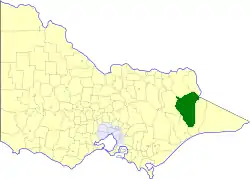Shire of Omeo
The Shire of Omeo was a local government area about 390 kilometres (242 mi) east-north-east of Melbourne, the state capital of Victoria, Australia. The shire covered an area of 5,641 square kilometres (2,178.0 sq mi), and existed from 1872 until 1994.
| Shire of Omeo Victoria | |||||||||||||||
|---|---|---|---|---|---|---|---|---|---|---|---|---|---|---|---|
 Location in Victoria | |||||||||||||||
| Population | 1,680 (1992)[1] | ||||||||||||||
| • Density | 0.2978/km2 (0.7713/sq mi) | ||||||||||||||
| Established | 1872 | ||||||||||||||
| Area | 5,641 km2 (2,178.0 sq mi) | ||||||||||||||
| Council seat | Omeo | ||||||||||||||
| Region | East Gippsland | ||||||||||||||
| County | Bogong, Benambra, Dargo, Tambo | ||||||||||||||
| |||||||||||||||
History
Omeo was incorporated as a shire on 25 October 1872.[2]
On 2 December 1994, the Shire of Omeo was abolished, and along with the City of Bairnsdale, the Shires of Bairnsdale and Tambo, and the Boole Boole Peninsula from the Shire of Rosedale, was merged into the newly created Shire of East Gippsland. The Dinner Plain district was merged into the Shire of Alpine, which had been created two weeks earlier.[3]
Ridings
Omeo was divided into four ridings on 15 January 1957, each of which elected three councillors:
- Omeo Riding
- Ensay Riding
- Hinnomunjie Riding
- Tongio Riding
Towns and localities
- Benambra
- Brookville
- Cassilis
- Dinner Plain
- Doctors Flat
- Ensay
- Hinnomunjie
- Omeo*
- Swifts Creek
- Tambo Crossing
- Tongio
- Uplands
* Council seat.
Population
| Year | Population |
|---|---|
| 1954 | 2,072 |
| 1958 | 2,100* |
| 1961 | 2,145 |
| 1966 | 2,026 |
| 1971 | 1,858 |
| 1976 | 1,605 |
| 1981 | 1,565 |
| 1986 | 1,628 |
| 1991 | 1,920 |
* Estimate in the 1958 Victorian Year Book.
References
- Australian Bureau of Statistics, Victoria Office (1994). Victorian Year Book. pp. 49–52. ISSN 0067-1223.
- Victorian Municipal Directory. Brunswick: Arnall & Jackson. 1992. pp. 796–797. Accessed at State Library of Victoria, La Trobe Reading Room.
- Australian Bureau of Statistics (1 August 1995). Victorian local government amalgamations 1994-1995: Changes to the Australian Standard Geographical Classification (PDF). Commonwealth of Australia. p. 4,6. ISBN 0-642-23117-6. Retrieved 5 January 2008.